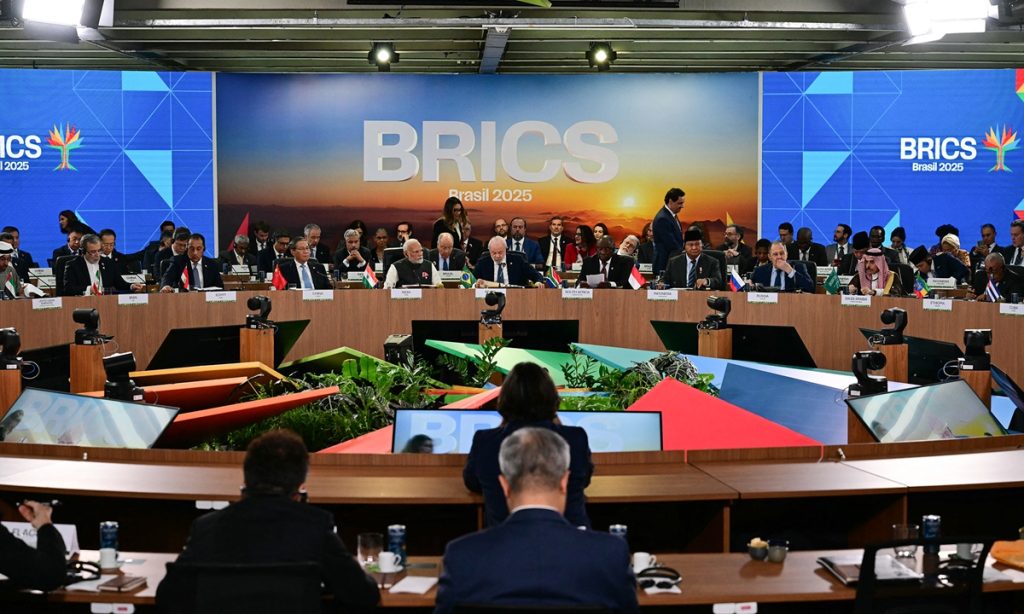BRICS Summit, joint declaration seal group’s commitment to multilateralism

The growing BRICS group gathered in Rio de Janeiro, Brazil for the 17th BRICS Summit on Sunday, and signed a joint declaration encompassing 126 commitments covering global governance, finance, health, artificial intelligence, climate change, and other strategic areas. The document sealed the group's commitment to strengthening multilateralism, defending international law, and striving for a more equitable global order.
Addressing the plenary session themed "Peace and Security and Reform of Global Governance" at the summit, Chinese Premier Li Qiang said that BRICS countries should strive to become the vanguard in advancing the reform of global governance, calling on the bloc to safeguard world peace and tranquility, and promote the peaceful settlement of disputes.
Chinese experts said on Monday that the expanded BRICS mechanism, with its vast economic scale, large populations, and significant contributions to the global economy, are gaining influence on the global stage. Their collective voice and actions are crucial for upholding the multilateral trading system centered on the World Trade Organization, strongly demonstrating that unilateralism and trade protectionism are ineffective and cannot intimidate the Global South.
In the face of growing conflicts and differences, it is necessary to enhance extensive consultation based on equality and mutual respect; in the face of deeply intertwined common interests, it is necessary to pursue joint contribution through solidarity; in the face of mutually beneficial development opportunities, it is necessary to hold an open mind to seek mutual success and shared benefits, said the Chinese Premier, Xinhua News Agency reported.
As the leading force of the Global South, BRICS countries should uphold independence and self-reliance, demonstrate a sense of responsibility, and play a greater role in building consensus and synergies, Li said.
Noting that China will establish a China-BRICS research center on new quality productive forces this year, Li also announced a scholarship established for BRICS countries to facilitate talent cultivation in sectors including industry and telecommunication.
At the meeting, leaders of the 11 largest emerging economies signed the Rio de Janeiro Declaration, reaffirming their commitment to the BRICS spirit of mutual respect and understanding, sovereign equality, solidarity, democracy, openness, inclusion, collaboration and consensus, per the official website of BRICS.
BRICS voiced serious concerns about the rise of unilateral tariff and non-tariff measures which distort trade and are inconsistent with WTO rules. "The proliferation of trade-restrictive actions," the declaration said, "threatens to further reduce global trade, disrupt global supply chains, and introduce uncertainty into international economic and trade activities."
Brazilian President Luiz Inacio Lula da Silva, who hosted the summit, criticized NATO's decision to hike military spending by 5 percent of GDP annually by 2035, stating that the world is facing an unprecedented number of conflicts since World War II, and NATO's move has fueled an arms race, according to media reports.
Lula also condemned certain countries for continuously violating the territorial integrity of others, which undermines efforts to resolve issues through negotiations and jeopardizes the process of nuclear non-proliferation, according to media reports.
Leaders of the BRICS group are expected to address the shared challenges of climate change on Monday, the final day of the summit in Rio de Janeiro, demanding that wealthy nations fund global mitigation of greenhouse emissions, per Reuters.
Resisting pressure
In a Truth Social post on Sunday, US President Donald Trump threatened to impose an additional 10 percent tariff on "any country aligning themselves with the Anti-American policies of BRICS" with "no exceptions," though it was not immediately clear which policies Trump was referring to, CNN reported on Monday.
Trump has previously threatened to impose 100 percent tariffs against the bloc if they take any moves to undermine the dollar.
Responding to the latest threat, Chinese Foreign Ministry spokesperson Mao Ning said at Monday's press briefing that BRICS is an important platform for cooperation among emerging markets and developing countries. It advocates openness, inclusiveness and win-win cooperation. It is not a bloc for confrontation. Nor does it target any country.
"On the US tariff hikes, China has made its position clear more than once. Trade war and tariff war have no winners, and protectionism leads nowhere," Mao said.
The 17th BRICS Summit was held under complex circumstances, particularly with intensified US pressure on the mechanism. Despite this, the summit was successfully convened and achieved pragmatic outcomes, playing a pivotal role in shaping BRICS' future development, Xu Feibiao, director of the Center for BRICS and G20 Studies with the China Institutes of Contemporary International Relations, told the Global Times on Monday.
This summit adopted a more simplified, efficient, and practical approach, focusing on six priority areas, including climate change, AI governance, and global public health governance, to deliver tangible results, Xu said, adding that the summit reaffirmed the BRICS spirit, principles, and objectives, solidifying the foundation for future cooperation and ensuring cohesion in a larger framework.
The summit maintained a low-key and moderate stance on sensitive issues, emphasizing BRICS as a development-focused platform rather than a confrontational bloc targeting any third party, in stark contrast to some antagonistic Western-dominated cliques, Xu added.